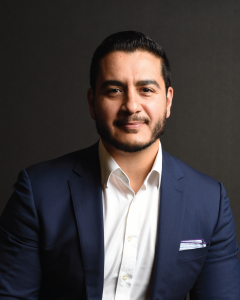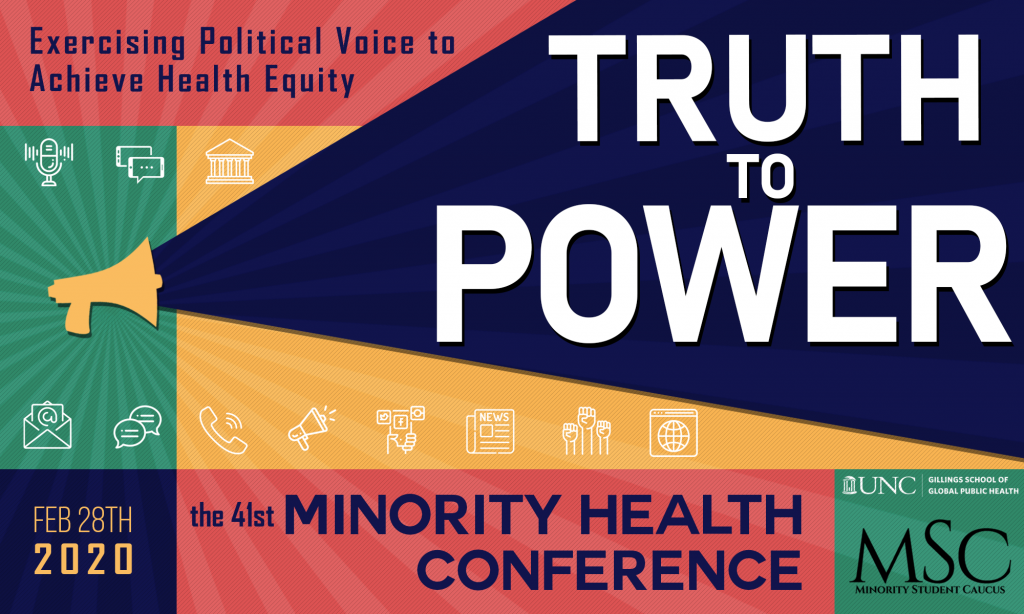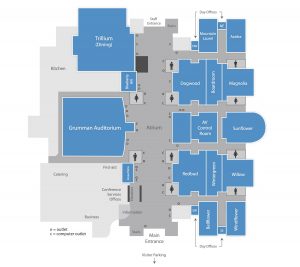41st Annual Minority Health Conference
Truth to Power
Friday, February 28, 2020
William and Ida Friday Center, Chapel Hill
This year’s theme is Truth to Power: Exercising Political Voice to Achieve Health Equity. Truth to Power recognizes a critical need for a more just and truthful world to improve our society. Historically, the courageous voices of people with less access to power have fueled movement-making and actions to disrupt resistive power structures. This year’s conference will focus on the tools and approaches we need to uplift marginalized voices, embolden effective leadership, and create policy that is community-driven and grounded in equity.
Support the Conference
DonateRegister for the Webcast
ApplyRegister as a Partner Conference
ApplyPress Release from the 41st Annual Conference Co-Chairs
Celebrating the 41st Anniversary of the Minority Health Conference:
Truth to Power
The UNC-Chapel Hill Gillings School of Global Public Health’s Minority Health Conference, the largest and longest-running student-led health conference in the country, aims to raise awareness around minority health and mobilize students, academics, and community members to take action for change. Established in 1977 by the Minority Student Caucus, the conference is nationally recognized and respected, attracting more than 600 attendees each year and hundreds more who view it via webcast.
We are excited to announce that this year’s theme is Truth to Power: Exercising Political Voice to Achieve Health Equity.
Truth to Power recognizes a critical need for a more just and truthful world to improve our society. Historically, the courageous voices of people with less access to power have fueled movement-making and actions to disrupt resistive power structures. This year’s conference will focus on the tools and approaches we need to uplift marginalized voices, embolden effective leadership, and create policy that is community-driven and grounded in equity.
Health is undoubtedly shaped by the conditions that we live in, and these conditions are constructed by the policies and institutions that write, enact, uphold, and govern them. We live in a time when our society is exhaustively polarized, political ideologies are divisive, and elections can have generation-defining outcomes. These outcomes disproportionately affect people of color and other communities, widening existing health inequities.
This conference seeks to critically examine the structural barriers that reinforce inequities and exclude the multi-faceted experiences of marginalized voices in the policy process. Truth to Power emboldens everyday citizens to hold decision-makers accountable to addressing the impact of discrimination, bias, and stressors that deepen societal fragmentations leading to differences in health outcomes.
The health and well-being of our communities has always depended on constructive and continued engagement with our political system. Fundamental to this process are decision-makers who authentically incorporate the voices of community members and who recognize community engagement, social integration, and political access as crucial determinants of health. Truth-telling – and, for many, truth hearing – need to be central to our decision-making process. As we move into a critical election year, this conference should ignite dialogue and encourage strategic action towards a more equity and community-centered approach in shaping our policy process.
— — —
At the Gillings School of Global Public Health, community is at the heart of what we do, lifting voices to accelerate change. The Minority Student Caucus was founded to raise the voices of black students and to impact policies at the School of Public Health.
Nearly every year since 1977, we have convened hundreds of community members, professionals and students to explore a diverse range of topics that have an impact on minority health. Together, we connect multidisciplinary champions working at the local, regional, national and global levels – and inform communities everywhere.
We look forward to seeing you at the conference on Friday, February 28, 2020, at the William and Ida Friday Center in Chapel Hill, North Carolina!
Sincerely,

Rakiah Anderson
|

Ishani Patel
|
41st Annual Minority Health Conference Agenda
February 28, 2020
*schedule subject to change
| 7:30 – 9:00 a.m. | Registration |
| 9:00 – 9:40 a.m. | Welcoming Remarks |
| 9:30 – 11:00 a.m. | Introduction and 22nd Annual William T. Small Jr. Keynote: LaTosha Brown |
| 11:00 – 11:45 a.m. | Exhibitors/Posters Sessions/Break |
| 11:45 am – 12:45 pm | Morning Breakout Sessions |
| 12:45 – 1:45 pm | Lunch |
| 1:45 – 3:15 pm | Introduction and 9th Annual Victor J. Schoenbach Keynote: Dr. Abdul El-Sayed |
| 3:15 – 4:00 pm | Exhibitors/Posters Sessions/Break |
| 4:00-5:00 p.m. | Afternoon Breakout Sessions |
22nd Annual William T. Small Jr. Keynote: LaTosha Brown

LaTosha Brown is an award-winning organizer, philanthropic consultant, political strategist and jazz singer with over twenty years of experience working in the non-profit and philanthropy sectors on a wide variety of issues related to political empowerment, social justice, economic development, leadership development, wealth creation and civil rights. She is the co-founder of Black Voters Matter Fund, a power building southern-based civic engagement organization that played an instrumental role in the 2017 Alabama U.S. Senate race. Ms. Brown is principal owner of TruthSpeaks Consulting, Inc., a philanthropy advisory consulting firm in Atlanta, GA. For more than 25 years, she has served as a consultant and advisor for individual donors, government, public foundations and private donors. Throughout her career, Ms. Brown has distinguished herself as a trusted expert and resource in political strategy, rural development and special programming for a number of national and regional philanthropies. She is the founding project director of Grantmakers for Southern Progress.
9th Annual Victor J. Schoenbach Keynote: Dr. Abdul El-Sayed

Dr. Abdul El-Sayed is a physician, epidemiologist, public health expert, and progressive activist. He is the Chair of Southpaw Michigan. His forthcoming book, “Healing Politics” (Abrams Press), diagnoses our country’s epidemic of insecurity and the empathy politics we will need to treat it, and he is the host of “America Dissected,” a podcast by Crooked Media, which goes beyond the headlines to explore what really matters for our health. In 2018, Abdul ran for Governor of Michigan on an unapologetically progressive platform. Though he finished second of three earning over 340,000 votes in the Democratic primary, his bid was endorsed by Senator Bernie Sanders, Congresswoman Alexandria Ocasio-Cortez, and The Nation. Prior, he served the City of Detroit as Health Director, appointed to rebuild Detroit’s Health Department after it was privatized during the city’s bankruptcy. He was the youngest health official in a major American city and was awarded “Public Official of the Year” by the Michigan League of Conservation Voters and “40 under 40” by Crain’s Detroit Business in view of his leadership. Prior to entering public service, he was Assistant Professor of Epidemiology at Columbia University’s Mailman School of Public Health where he led Columbia’s Systems Science Program and Global Research Analytics for Population Health. He has over 100 peer-reviewed scientific publications that have been cited over 1200 times. Abdul earned a Doctorate in Public Health from Oxford University, where he was a Rhodes Scholar. He also holds a Medical Degree from Columbia University where he was an NIH-funded Medical Scientist Training Program Fellow and Soros New Americans Fellow. He graduated Phi Beta Kappa with Highest Distinction from the University of Michigan, where he was chosen to deliver the student remarks alongside President Bill Clinton. He is a native Michigander who was born and raised in Metro Detroit, where he lives with his wife Sarah, a psychiatrist, and daughter Emmalee. He is a proud member of UAW Local 1981, AFT Local 477, and SEIU Local 500. He enjoys good people, good coffee, good food, and University of Michigan football.
William and Ida Friday Center Map
Fees
| Fee Type | Fee |
| Student Attendee (Refund Policy) | $50.00 |
| Senior Citizen Attendee (Refund Policy) | $50.00 |
| All Others (Refund Policy) | $160.00 |
| Continuing Education Units (Optional) (Refund Policy) | $10.00 |
Checks
Checks should be made payable to UNC Chapel Hill and mailed to
NCIPH
Attn: Registrar
Campus Box 8165
Chapel Hill, NC 27599
For UNC departmental journal entry payments contact Cherelle Whitfield at cwwhitfi@email.unc.edu.
Refund Policy
Full refund if cancelled by Friday, February 14, 2020. Regardless of the refund amount listed, the amount refunded will never exceed the amount paid.
Accommodations
Courtyard by Marriott -adjacent to the Friday Conference Center
The UNC rate is $134 plus tax/nightly through the direct booking link.
Aloft Hotel
The Aloft Hotel is 1.5 miles from the Friday Conference Center.
Additional Hotels
There are several hotels in the Southpoint Mall area that offer a UNC rate. These hotels are approximately 5 miles from the Friday Conference Center.
PARTNERS


SPONSORS
Old Well Sponsor ($10,000 +)

Bell Tower Sponsor ($5,000 – $9,999)

Carolina Sponsor ($2,000 to $4,999)




Connect
Make sure to get the latest updates by following us on social media, and joining our mailing list to stay up to date on all the latest conference news and announcements!


